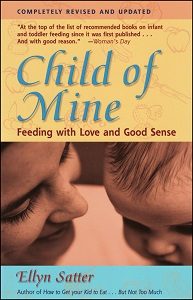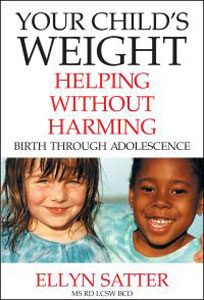

Family Meals Focus
The Ellyn Satter Institute Newsletter
The toddler who “can’t get filled up”
by Ellyn Satter, Family Therapist and Registered Dietitian
If you have a large child, you will get lots of interference, and you may have lots of misgivings. Keep your courage, and follow the division of responsibility in feeding. Trying to restrict a child’s weight by making her go hungry is cruel. Moreover, it doesn’t work. Restricting a child’s food intake will make her think about food all the time, eat as much as she can whenever she can, and become fatter rather than thinner.
Parents fear their fat baby will grow up fat
Twelve-month-old Lena’s first word was “hungry.” By the time she was 15 months old, she sang a little song all day long, “hungry, hungry, hungry.” Ever since she was born, Lena’s weight plotted above 95th percentile, and she loved to eat. Lena’s parents got lots of comments about her size and eating from family, friends, and even strangers. Thinking that being big and loving to eat meant she would be fat for life, Lena’s parents didn’t let her eat as much as she wanted. That seemed to work all right when she couldn’t crawl, walk, or talk, but now she was relentless about food, singing her song, sneaking into the cupboard and refrigerator, and having tantrums about wanting more food at meal- and snack-time. Lena’s obsession with food was a wakeup call for her parents. They had seen that behavior in other children, and they didn’t want that for Lena.
The division of responsibility in feeding works with food-obsessed children
Soon Lena stopped singing her little “hungry” song and happily played by herself rather than hanging around her parents begging for food.
When Lena’s parents read Child of Mine: Feeding with Love and Good Sense, the division of responsibility in feeding was an epiphany. After a couple of weeks of doing their jobs with feeding and letting Lena do hers with eating, even though she ate a lot, Lena’s eating began to settle down. She stopped singing her song, she stopped panhandling, she began to eat less, and best of all, she was happy. She smiled and laughed and played by herself rather than continually hanging around them, begging for food.
Parents felt bad about their errors in feeding
Often, you have to do something differently in order to realize the error of your ways. Lena’s parents realized that from the first they had been trying to control her eating and that it had made her afraid she wouldn’t get enough to eat. It was such a relief to them to just relax and enjoy her. They found that not worrying about Lena’s food or size made them aware of what a wonderful little girl she is. It was heartbreaking for Lena’s parents to realize what they had done to her – and to themselves. But we all make mistakes, and their taking responsibility for their mistakes was most important of all. They owned up to the fact that what they were doing was making their daughter miserable, and they changed their ways.
The large child: helping without harming
To help you defend yourself against your own and others’ inclination to try to get your large child to eat less and be slimmer, you need the courage of your convictions. To help you, read Your Child’s Weight: Helping Without Harming. Remember, it’s not over until it’s over. Most large children slim down as they get older. Even if they don’t slim down, supporting a child in growing consistently at a high level is just fine. As Lena’s parents discovered, trying to restrict a child’s weight by making her go hungry is simply unthinkable. Moreover, it doesn’t work. Restricting a child’s food intake is likely to make her fatter rather than thinner.
Explore
To understand how to be faithful about doing your jobs with feeding and scrupulous about letting your child do her jobs with eating. read Ellyn Satter’s Child of Mine: Feeding with Love and Good Sense.

For help with raising your big child or your small child to feel good about himself and have the body that is right for him, read Ellyn Satter's Your Child’s Weight: Helping Without Harming

